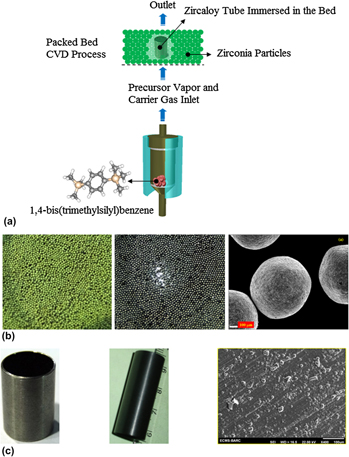Crossref Citations
This article has been cited by the following publications. This list is generated based on data provided by
Crossref.
Filipescu, M.
Stokker-Cheregi, F.
Colceag, D.
Nedelcea, A.
Birjega, R.
Nistor, L.C.
and
Dinescu, M.
2013.
Morphological and structural characterization of SiC based composite nanostructures.
Applied Surface Science,
Vol. 278,
Issue. ,
p.
96.
Wróbel, Aleksander M.
Walkiewicz‐Pietrzykowska, Agnieszka
and
Uznanski, Pawel
2014.
Thin a‐SiC:H Films Formed by Remote Hydrogen Microwave Plasma CVD using Dimethylsilane and Trimethylsilane Precursors.
Chemical Vapor Deposition,
Vol. 20,
Issue. 4-5-6,
p.
112.
Wrobel, A.M.
Walkiewicz-Pietrzykowska, A.
and
Uznanski, P.
2014.
Remote hydrogen microwave plasma chemical vapor deposition from methylsilane precursors. 1. Growth mechanism and chemical structure of deposited a-SiC:H films.
Thin Solid Films,
Vol. 564,
Issue. ,
p.
222.
Liu, Rongzheng
Liu, Malin
and
Chang, Jiaxing
2016.
Experimental phase diagram of SiC in CH3SiCl3–Ar–H2 system produced by fluidized bed chemical vapor deposition and its nuclear applications.
Journal of Materials Research,
Vol. 31,
Issue. 17,
p.
2695.
Liu, Rongzheng
Liu, Malin
and
Chang, Jiaxing
2017.
Large-scale synthesis of monodisperse SiC nanoparticles with adjustable size, stoichiometric ratio and properties by fluidized bed chemical vapor deposition.
Journal of Nanoparticle Research,
Vol. 19,
Issue. 2,
Istomina, E. I.
Istomin, P. V.
Nadutkin, A. V.
Kargin, Yu. F.
and
Lysenkov, A. S.
2018.
Preparation of a SiC Fiber Textile Material.
Inorganic Materials,
Vol. 54,
Issue. 8,
p.
787.
Peng, Sai
Jiang, Yong
Xu, Canhui
Hu, Shuanglin
and
Wang, Yinglou
2019.
Surface stabilities of 3C–SiC and H2O adsorption on the (110) surface.
Journal of the American Ceramic Society,
Vol. 102,
Issue. 10,
p.
6256.
Zhang, Pengfei
and
Zhang, Yulei
2021.
Initial oxidation of 3C-SiC (111) in oxidizing atmosphere containing water vapor: H2O adsorption from first-principles calculations.
Materials Today Communications,
Vol. 26,
Issue. ,
p.
102072.
Shao, Kuanliang
Liu, Xinghua
and
Zhang, Jingsong
2023.
Thermal Decomposition Mechanism of Tetraethylsilane by Flash Pyrolysis Vacuum Ultraviolet Photoionization Mass Spectrometry and DFT Calculations: The Competition between β-Hydride Elimination and Bond Homolysis.
The Journal of Physical Chemistry A,
Vol. 127,
Issue. 18,
p.
3966.
Peng, Sai
Chen, Yijie
Jia, Yunping
Hu, Shuanglin
Zhou, Xiaosong
and
Xu, Canhui
2023.
Understanding the adsorption behavior of oxygen on the 3C–SiC(1 1 0) surface: A first‐principles study.
Journal of the American Ceramic Society,
Vol. 106,
Issue. 6,
p.
3676.
Muhammad, Nadeem
Hussain, Irshad
Ali, Amjad
Noureen, Laila
He, Qing
Subhani, Qamar
Khan, Niaz Ali
Cui, Hairong
and
Zhu, Yan
2024.
Ion chromatography: A comprehensive review of sample preparation methods for analysis of halogens and allied nonmetals in critically challenging inorganic matrices.
Journal of Chromatography A,
Vol. 1734,
Issue. ,
p.
465311.
Voon, Chun Hong
Adam, Tijjani
Shamsuddin, Shahidah Arina
and
Lim, Bee Ying
2024.
Hybrid-Nanomaterials.
p.
171.



